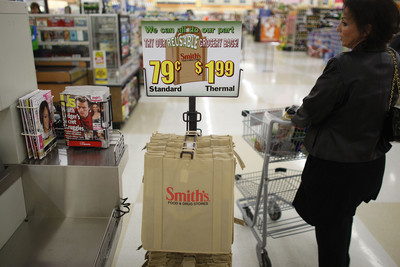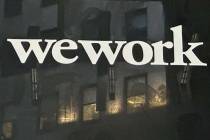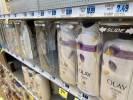Grocers bag plastic sacks
How do you get a registered nurse to talk trash?
Ask her about plastic bags.
As University Medical Center nurse Kim Hofstad loaded her pickup with groceries from Smith's Food & Drug on Rancho Drive on Wednesday afternoon, she talked about why she refuses to cart her food home in plastic sacks. Part of it is convenience: Paper bags simply fit better in Hofstad's kitchen garbage can.
But Hofstad also deplores the environmental fallout of ubiquitous plastic film.
"You rarely see a paper bag flying around as litter in the wind or on the street, but you see all kinds of plastic bags everywhere," she said. "I don't know what the deal is."
Hofstad may soon see fewer plastic sacks adrift on local streets, as growing numbers of grocers encourage consumers to buy reusable bags to cut back on plastics, and to return plastic bags to stores for recycling.
Smith's is the latest company to roll out a reusable-bag program. The grocer began selling reusable bags at all of its 133 stores, including 42 Nevada locations, about six weeks ago. The bags consist of polypropylene, a stiff plastic, and come in two varieties: a standard version for nonperishable goods that sells for 79 cents, and an insulated bag for hot and cold foods that retails for $1.99. The bags resemble brown paper bags, and they can hold three plastic bags' worth of groceries.
"There's a heightened awareness among consumers about how they can make simple adjustments in their daily shopping decisions and have significantly less impact on the environment," said Marsha Gilford, vice president of public affairs for Smith's. "We see it in our stores in terms of consumers' interest in organic produce, and in Earth-friendly products such as less-toxic cleaning agents. We think customers are eager to take measures that will help the environment."
Smith's isn't the first local grocer that's aimed to shift customers to plastic alternatives.
Albertsons began selling 99-cent reusable bags in 2006. Trader Joe's also sells reusable sacks for $1.99, and bags groceries in paper, too. And Whole Foods will go plastic-free in all its North American stores by Earth Day on April 22. It will be offering 99-cent reusable bags and recycled paper bags instead.
Entire states and municipalities are also acting, curbing the use of plastic bags or passing rules to keep them from becoming litter. The New York City Council enacted a law this month requiring stores to collect and recycle bags, following a similar law in California. The nation's first bag ban took effect in November in San Francisco, where big grocers may use only plastic bags made of compostable material.
Officials at the cities of Las Vegas and Henderson said they don't have plans to address plastic bags. Clark County officials have looked into other jurisdictions' policies and continue to consider possible action on the topic, spokesman Dan Kulin said. But there are no concrete plans right now to craft new rules.
The city of North Las Vegas didn't comment for this story.
The United States lags behind many other countries in limiting use of plastic bags. Ireland and Germany levy fees for every bag stores hand out, and several African nations have set thickness requirements that have effectively banned flimsy bags that float in the air. Earlier this month, China, the world's fastest-growing economy, banned free plastic shopping bags and encouraged people to use cloth ones instead.
Plastic bags may be the latest addition to an ever-growing litany of environmental nemeses, but they weren't always deemed an ecological threat.
They first appeared in the late 1970s to serve as saviors to vast stands of forest. It would take about 41 million trees a year to yield a volume of paper bags equivalent to the number of plastic bags people use, said Keith Christman, senior director of packaging for the American Chemistry Council and Progressive Bag Affiliates. Making plastic bags also uses "dramatically less" energy than manufacturing paper sacks, and plastics production generates half the greenhouse gases that paper-making creates, he said.
"There really are some dramatic environmental benefits to using plastic bags," Christman said.
So what's with today's sudden ground swell against plastic grocery bags?
For one thing, as Hofstad noted, people spot them as trash everywhere: sailing on the wind, entangling trees, lining gutters. And despoiling both countryside and cityscape isn't the best way for a product to build a positive public image.
"They're just not good for the environment," said Las Vegan Cathy Gilpin as she loaded groceries into her car Wednesday afternoon at Smith's on Rancho.
What's more, Christman added, consumers believe that plastic bags are oil-based, and with today's concerns about the United States' dependence on foreign oil, people are likely to approach any oil-intensive product with caution.
Christman said neither reason is cause for bagging plastic bags.
First, many packaging materials, not just plastic bags, become litter -- a problem improved recycling would help. The Progressive Bag Alliance is working with environmental advocate Keep America Beautiful to boost recycling programs. Also, Smith's and Albertsons are among grocers who ask customers to return plastic bags they won't reuse. Bag makers already recycle 650 million pounds of plastic bags annually, Christman said.
And plastic bags in the United States are made from a natural-gas derivative rather than oil, so the petroleum issue is, well, a nonissue, Christman said.
Besides, 92 percent of consumers already reuse their plastic grocery bags for picking up pet waste, bringing lunch to work and keeping the car free of trash, Christman noted. It's important to give consumers a "lifestyle choice" on bags they receive at the store, he said.
If that choice is left to customers, expect to see them carrying more reusable bags.
Gilford said it's too early to post sales numbers on the reusables, but a sales rack inside Smith's on Rancho was nearly empty Wednesday afternoon, with just seven bags left.
Gilpin has already bought several reusable sacks from Smith's and Albertsons. Her shopping cart on her Wednesday trek to Smith's still contained several plastic bags full of groceries, because she bought more food than her reusable containers could carry. She said she hopes to eventually have enough reusable bags to use them exclusively.
"They're handy, and they're sturdier than a plastic bag," Gilpin said.
Linda, a Smith's shopper who declined to give her last name, said she asks for plastic bags, and reuses them to pick up after her dog. Linda said she hadn't noticed the reusable bags for sale inside the store, but said she'd look for them on her next trip to Smith's.
"It'd be nice to always have my own bags, and keep them in the car after I'm done shopping," she said. And ditching plastics would mean "we don't fill up our landfill so fast," she added. "It would be good for the environment."
Even Hofstad, who swears by her paper bags, could be convinced to go the reusable route.
"If they stop carrying paper bags, I would buy half a dozen reusable bags, but I would never go to plastic," she said. "I think that's what it will come to -- it'll come to the point where we'll all have to bring our own bags."
The Associated Press contributed to this report. Contact reporter Jennifer Robison at jrobison@reviewjournal.com or (702) 380-4512.





























